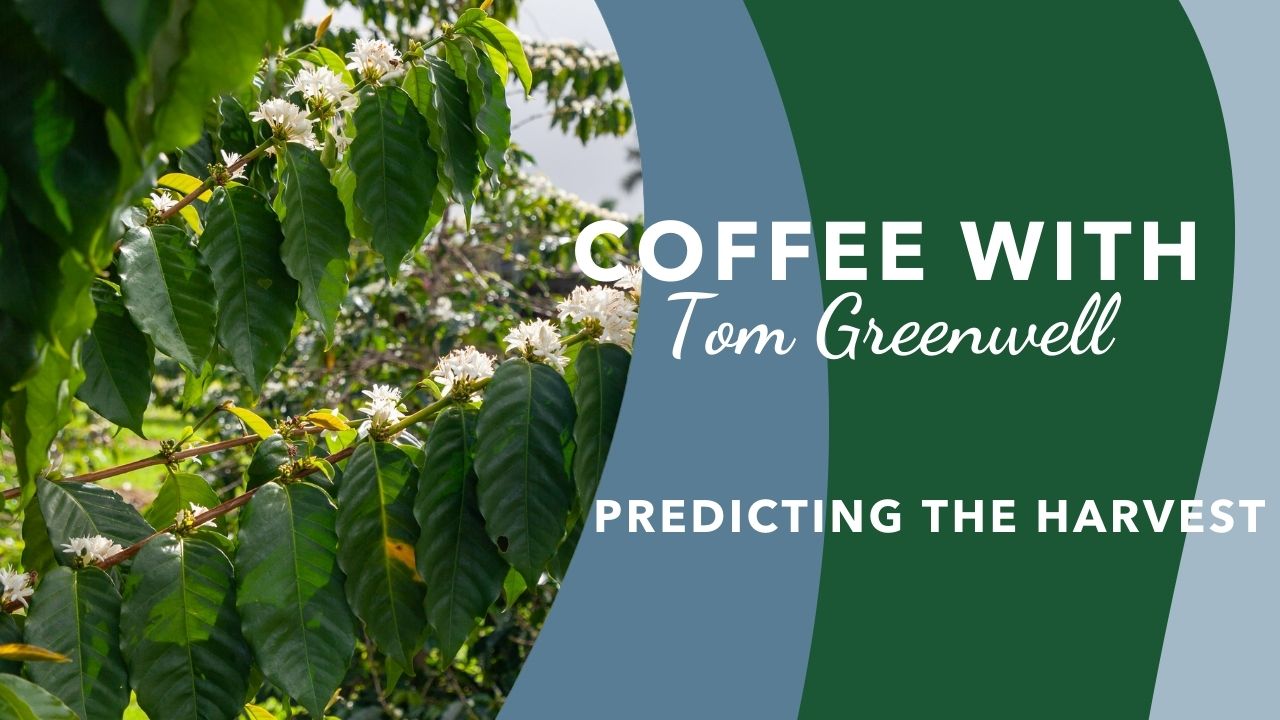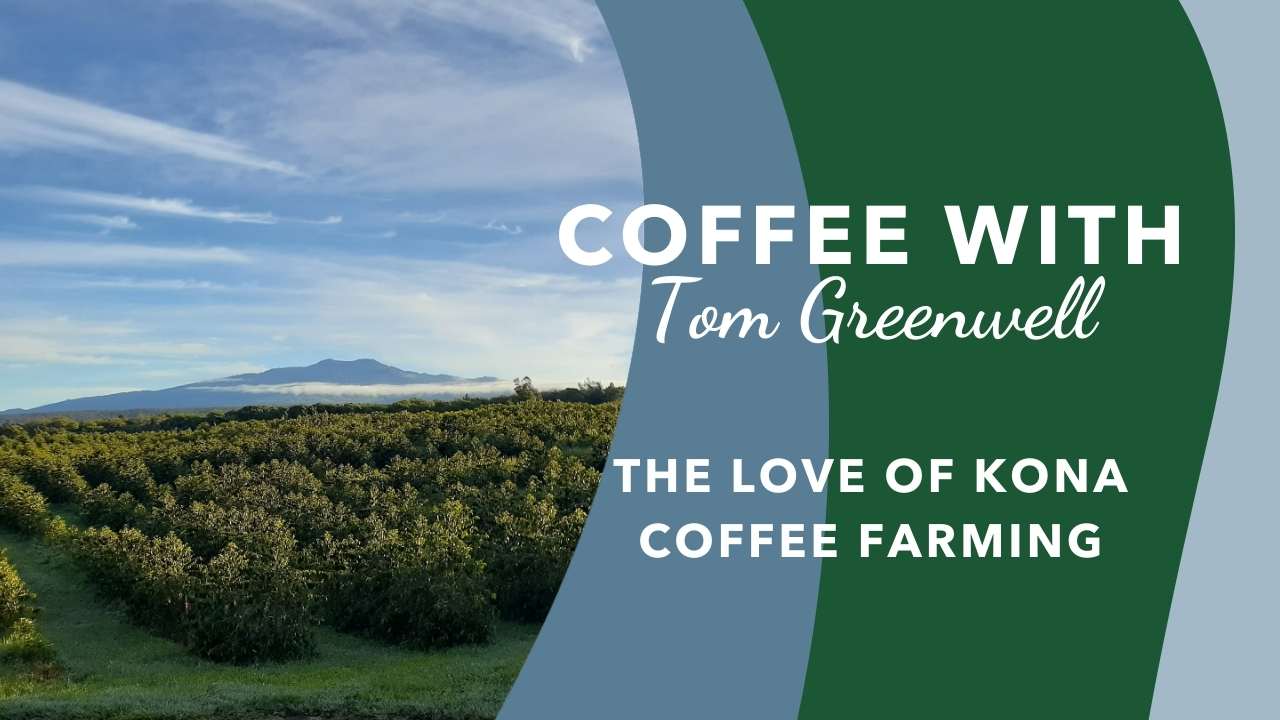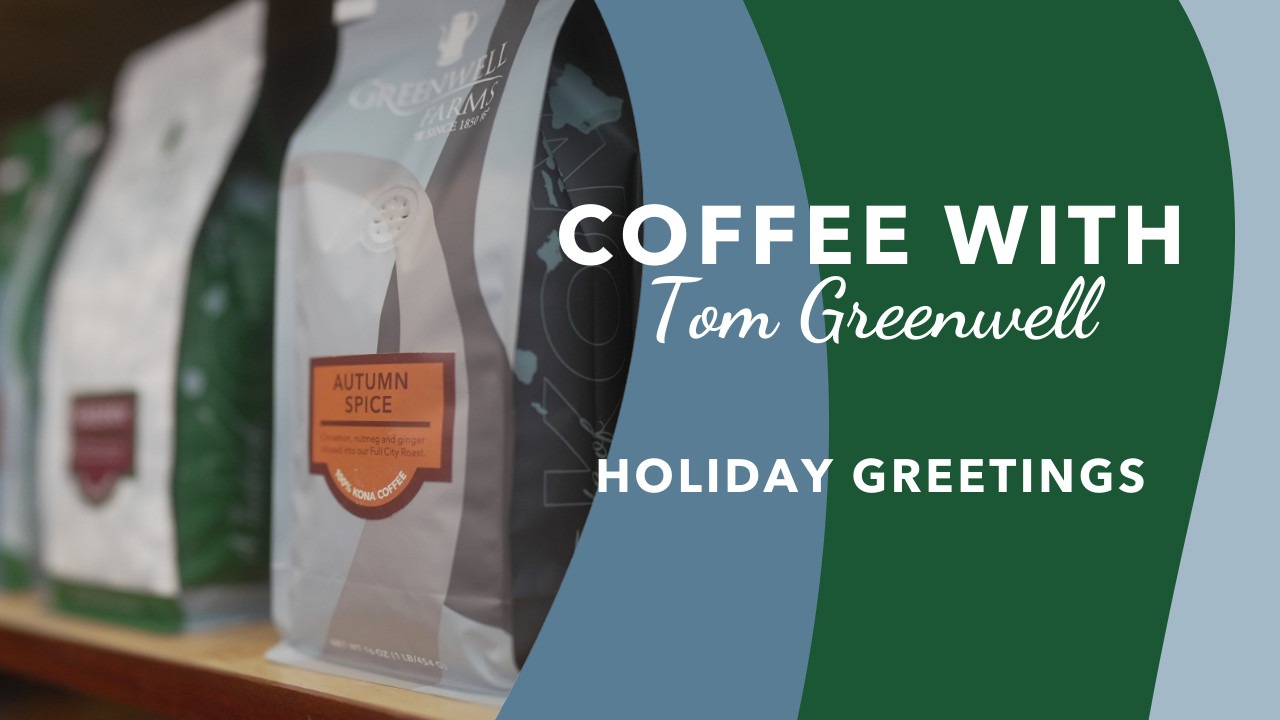Episode 31: Meet Our Farm Manager, Robert Beck
Join Tom Greenwell and our farm manager, Robert Beck, as they take you behind the scenes at Greenwell Farms. In this episode, you’ll hear first-hand stories about life on the farm, the passion behind every crop, and what it really means to grow 100% Kona Coffee.
Episode Transcript:
[00:00:05] Tom Greenwell: I’m here standing with my farm manager, Robert Beck.
[00:00:09] Robert Beck: Hello.
[00:00:11] Tom Greenwell: Robert’s been with us now going four years.
[00:00:15] Robert Beck: Yeah. Bit over.
[00:00:18] Tom Greenwell: So what can you tell us a little bit about, you know, your day, general day?
[00:00:29] Robert Beck: Oh, my day, starts at. Six in the morning where I do all try to get all my office, you know, work in, you know, making sure all the hours and everyone’s gonna get paid correctly. After that, head out into the field, you know, check all my moisture, you know, rain gauges, temperature, getting my guys set up for their daily tasks. And they’re just out in the field, you know, making sure we’re not missing anything on the, in the field. Yeah.
[00:01:09] Tom Greenwell: So, so, you know, you’ve been farming for over 20 years, right?
[00:01:16] Robert Beck: Yep.
[00:01:19] Tom Greenwell: What is the challenges do you see in, you know, in farming, coffee, you know, gimme an instant of, something maybe new or unique?
[00:01:31] Robert Beck: Well, the, I mean, I’ve always said, you know, the, challenge is it’s always from the root to fruit. You know, there’s something that is always trying to attack your coffee trees. But the newest, you know, challenge we have is trying to control, you know, the rust that’s been here for the several years. And I feel that we’ve gotten thing’s under control, but that’s our newest challenge.
[00:02:03] Tom Greenwell: Well, I’m gonna, I’m gonna say something. You have gotten it under control. Yeah, it, we’ll see a little rust once in a while, but it’s a really, difficult what’s a fungus, right?
[00:02:19] Robert Beck: Yeah.
[00:02:20] Tom Greenwell: To control. And if you do it right, you can see these trees are beautiful, green. I don’t see any rust. Actually, the scientists came by the other day and confirmed that, right?
[00:02:31] Robert Beck: Yeah. Well this variety of pacamara. They’re real susceptible to rust, so.
[00:02:35] Tom Greenwell: Yeah.
[00:02:36] Robert Beck: It’s looking really good. One thing, you know, with the rust that it tends to mutate and become a stronger, you know.
[00:02:49] Tom Greenwell: Fungus.
[00:02:49] Robert Beck: Become stronger fungus. Yeah. And, so the object is to, you know, try and kill it and, you know, not really what you would say. Like, treat it, you know, and just.
[00:03:02] Tom Greenwell: Eradicate it.
[00:03:03] Robert Beck: Yeah, as it becomes, it can become immune to whatever fungicide you’re throwing at, and then it no longer become effective.
[00:03:14] Tom Greenwell: Yeah. So also I got. Of all the varieties we have on the farm, what’s your favorite variety for, you know, farming? Maybe not your best cup, but, you know, what variety do you like to farm here? We have a lot of varieties.
[00:03:34] Robert Beck: For me, it’s gotta be the typica, you know, it’s an all around tree. Doesn’t really, show signs, you know, of stress when taking care of well. You know, yeah.
[00:03:51] Tom Greenwell: It’s not finicky.
[00:03:53] Robert Beck: Yeah, and you know, it’s the original tree that’s been around in Kona. It’s what made Kona, you know, Kona.
[00:04:00] Tom Greenwell: Right.
[00:04:01] Robert Beck: For me and, I like working with the typica.
[00:04:08] Tom Greenwell: So, okay, so the weather. Today’s a nice sunny day. I’m sweating in the sun. We’re not used to it for the last three, four months. How important the rain?
[00:04:25] Robert Beck: Well, I think you and I have both, you know, said it like no matter how much it rained, we will never complain about rain, you know, because.
[00:04:33] Tom Greenwell: Nope.
[00:04:35] Robert Beck: You know, we always could use some rain.
[00:04:38] Tom Greenwell: Because you started out, you mentioned that you check rain gauges and temperatures.
[00:04:42] Robert Beck: Every day.
[00:04:43] Tom Greenwell: Every morning. And how, useful is that for you?
[00:04:48] Robert Beck: Well then, you know, we can see a pattern, you know, like we’ve talked about, we got records going back for, you know, decades and, you can see the pattern of what year it might rain more. What year it might rain less, you know? Just a few short months ago, you know, down in Bonito, we were so worried that the trees weren’t gonna, you know, weren’t gonna make it because there wasn’t any rainfall.
[00:05:16] Tom Greenwell: It was dry. Yeah.
[00:05:17] Robert Beck: Then just like that, I mean, we probably had over 20 inches of rain, you know, within the last few months.
[00:05:25] Tom Greenwell: So we were talking about the rainfall and importance, irrigation. I mean, we don’t irrigate.
[00:05:36] Robert Beck: No. Yeah.
[00:05:37] Tom Greenwell: I don’t allow you to irrigate, right?
[00:05:39] Robert Beck: Yeah. Although some of our fields are set up for it. but it’s, we basically, you know, take, Mother Nature, you know, and take our punches, making sure that trees are healthy as can be, and always try to, you know, stay ahead of the weather, you know. I don’t know if that’s correct, but.
[00:06:07] Tom Greenwell: Well, no, you’re right. I mean, you know, look how healthy these trees are.
[00:06:12] Robert Beck: Yeah.
[00:06:13] Tom Greenwell: If it goes into a drought, we’ll be coming out of it healthy. So anyway, thanks a lot Robert.
[00:06:18] Robert Beck: Yeah.
[00:06:18] Tom Greenwell: Appreciate it.
Watch our previous episode here: Anatomy of a Coffee Cherry






